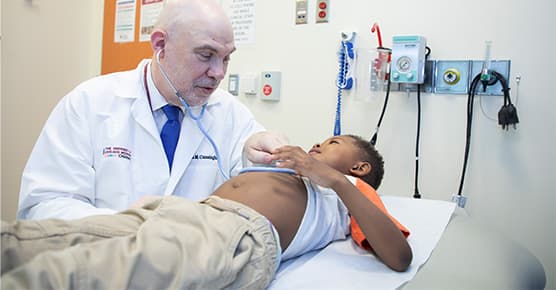Pediatric Non-Rhabdomyosarcoma Soft Tissue Sarcoma (NRSTS)
Soft-tissue sarcomas that are not rhabdomyosarcomas are classified as non-rhabdomyosarcoma soft tissue sarcomas (NRSTS). Examples of the many types of NRSTS cancers include fibrosarcoma, leiomyosarcoma, liposarcoma, neurofibrosarcoma, peripheral nerve sheath tumors and synovial sarcoma. These cancerous tumors arise in the soft tissues of the body including tendons, muscles, nerves, fatty tissue and fibrous tissue. NRSTS can essentially occur at any site in the body containing these normal types of tissues, such as in the arms and legs, the head and neck region, the chest, abdomen and pelvis. NRSTS accounts for less than 5 percent of all pediatric cancers.
Certain types of NRSTS are most likely to affect infants (under 1 year of age), while other types are more common in adolescents and young adults. Because soft tissue is expandable, these tumors can sometimes grow rather large before they are felt or cause problems for the patient. Like all cancers, they can invade surrounding tissues and metastasize (spread) to other organs of the body.
Symptoms, Diagnosis & Treatment of Non-Rhabdomyosarcoma
In the early stages, NRSTS usually do not cause any symptoms, especially if they are located deep inside the abdomen or pelvis where a lump cannot be felt. When the tumor grows larger a child may notice the following symptoms:
- A swelling or lump which may or may not be painful
- Pain or soreness caused by the tumor pressing on nerves or muscles
- Obstruction of the bowels when tumors become large in the abdomen
- Limping when the tumors arise in the legs
These symptoms may resemble other conditions or medical problems seen in children and young adults. Always consult a physician for a diagnosis.
NRSTS are relatively rare forms of cancer, and there are many different subtypes. Because of this, arriving at the correct diagnosis can be particularly challenging. Multilevel, advanced diagnostics are necessary to detect, locate, identify and stage non-rhabdomyosarcoma. These tests often include direct analysis of genetic material from the tumor. This type of test requires special expertise. Once a NRSTS is diagnosed, your care team will perform imaging studies and procedures including:
- X-ray: Often used as an initial test to identify a tumor within the chest, abdomen or in a bone
- Magnetic resonance imaging (MRI) scan: To determine the extent of the tumor
- Computed tomography (CT or CAT) scan: To identify the location of tumors within the abdomen, chest, pelvis or other sites
- Bone scans: To detect rhabdomyosarcoma that may have spread to bones
- Positron emission tomography (PET) scan: To find small tumors or check if treatment is working effectively
- Ultrasound: Sometimes used in addition to CT or MRI to identify the location of a tumor within the abdomen or within a muscle.
- Biopsy: To remove a small amount of the soft tissue tumor for microscopic examination by an expert pathologist. It is very rare for NRSTS to spread to the bone marrow. However, if your doctors have a reason to suspect this, a sample of bone marrow is also collected as part of the staging procedures. Certain types of NRSTS can also spread to lymph nodes that are near to the primary tumor site. In this case, biopsies may include samples of the lymph nodes in the region.
- Lumbar puncture/spinal tap: To remove a small amount of cerebral spinal fluid for microscopic evaluation. This test is only needed if it appears that the rhabdomyosarcoma has extended into the brain or spinal cord.
Using extensive, specialized testing of the tissue, the pathologist is able to confirm the diagnosis and identify the type of sarcoma. The sarcoma team will assign a stage to the tumor, which takes into consideration the size of the tumor and whether it has spread to other sites in the body. With detailed analysis of the pathology material to determine if the NRSTS is high- or low-grade (meaning more malignant or more benign), the team works together to define a treatment plan that is different depending on whether the tumor is felt to be at low-, intermediate-, or high-risk of coming back or spreading (metastasizing) to other sites.
Treatment for non-rhabdomyosarcomas requires several levels of therapy and is "risk-based," meaning that the treatment is tailored to the level of risk for tumor recurrence or metastasis. There are essentially three types of therapy that can be used individually or in combination: surgery, radiation therapy and chemotherapy.
Surgery: Removes the cancer and a margin of healthy tissue surrounding it. If the tumor is in an arm or leg, it is sometimes necessary to amputate all or part of the limb; however, this is relatively rare. In some cases, especially small and low-grade NRSTS that have not spread, surgery may be the only treatment.
Radiation therapy: Can be given before surgery to shrink the tumor or after surgery to kill any remaining cancer cells that may have been left at the "margin" of the tumor. Radiation is sometimes used if it is not possible to remove the entire tumor without an amputation. Radiation is usually reserved for higher-grade NRSTS which are more likely to come back following surgical removal.
Chemotherapy: Given to try to shrink the tumor and make it more accessible for surgery or radiation therapy, and also to prevent the tumor from coming back.
Some patients may be eligible for studies of the very newest therapies through clinical trials being conducted at Comer Children's. Parents are closely involved in deciding whether or not to enroll their child in a clinical trial. Clinical trials are only considered by the sarcoma team if they are thought to provide the best chance to cure the non-rhabdomyosarcoma soft tissue sarcoma.
Frequently Asked Questions About Non-Rhabdomyosarcoma Soft Tissue Sarcomas (NRSTS)
What causes non-rhabdomyosarcoma soft tissue sarcoma (NRSTS)?
Most of the time, the cause of an individual patient’s non-rhabdomyosarcoma soft tissue sarcoma (NRSTS) is not known. Certain types of NRSTS are thought to occur at a site where radiation therapy was previously given. Certain types of NRSTS can also develop in children or young adults who have an inherited risk of developing cancer.
What are the risk factors for NRSTS?
Children with certain hereditary conditions are at an increased risk for developing the disease. It has also been associated with radiation therapy given earlier in life for other types of cancer.
Do I have to worry that my other children will get a soft-tissue sarcoma?
It’s rare for other family members to be affected. We always analyze the family history for each new patient. Occasionally a genetic problem is suspected. In that case, the patient and certain family members will be offered the chance to be evaluated in our Pediatric Familial Cancer Center to better understand whether any inherited traits put them at risk of developing cancer.
What does the tumor stage mean?
Once the diagnosis has been confirmed, your oncologist will assign a stage to the NRSTS. Staging for NRSTS is complex and depends on the location of the primary tumor, the size of the tumor, the involvement of nearby tissues, whether lymph nodes are involved, and if the cancer has spread to distant parts of the body.
Where do soft-tissue sarcomas spread?
The tumor cells can invade surrounding tissue and metastasize (spread) to other organs in the body. When NRSTS spreads, it is most commonly found in the lungs. Some types of NRSTS can spread to lymph nodes or other sites.
Will my child need surgery?
NRSTS usually requires surgery for the initial biopsy, removal of all or part of the primary tumor, and removal of tumors that may have metastasized (spread) to other sites. Surgery is the primary treatment for NRSTS.
Will my child need chemotherapy? If so, how is it given?
Chemotherapy can be a critical part of the comprehensive and multidimensional treatment plan for some NRSTS, especially those that are at high-risk of recurrence and/or have spread to other parts of the body. Chemotherapy is given intravenously (IV) through a catheter (called a “central line”) that is placed under the skin. Chemotherapy is usually given over a period of two to three days in the hospital. Each of these two- to five-day “cycles” of chemotherapy is given about every three weeks, for approximately six cycles. For some types of NRSTS, chemotherapy is not used.
Will my child need radiation treatment?
Radiation is often used in patients with NRSTS to help shrink the tumor before and/or after surgery. In some cases, it is used instead of surgery.
How long will treatment take? How long will my child be in the hospital?
When chemotherapy is used for NRSTS, it is usually given in cycles, with each cycle covering a period of two to three days in the hospital. A new cycle is given approximately every three weeks. For most of the time between cycles, patients only return to clinic for a checkup once per week. The number of cycles varies, depending on the type of NRSTS and the stage; if chemotherapy is used, the total duration of chemotherapy is usually 15 to 20 weeks. At some stage before or during the treatment, surgery is often performed to remove the visible tumor. The recovery period in the hospital varies from patient to patient, lasting from several days to one to two weeks. Radiation therapy, if needed, is given five days per week for four to six weeks. It is administered in the outpatient treatment center. Chemotherapy is often modified or delayed during surgery or radiation therapy.
What are the side effects of treatment?
Chemotherapy drugs not only attack the cancer cells, they can injure normal tissue and blood-forming cells. For this reason, your child may experience some of the common side effects of chemotherapy including low blood counts (causing anemia), nausea, vomiting, hair loss, mouth sores, irregular periods (girls) and inability to produce sperm (boys). Radiation therapy may put children at a risk of developing a second malignant tumor later in life. Your treatment team will do everything they can to reduce or prevent side effects of treatment.
Does treatment cause infertility?
Patients and their parents should talk to their doctor about the reproductive risks associated with cancer treatment. In certain situations, there are options available to try to preserve fertility, such as with sperm banking. These programs are available at Comer Children’s.
What is the prognosis for survival?
The prognosis for survival varies depending on the exact type of NRSTS, whether the tumor has a low- or high-grade, and whether it is at an early or advanced stage when it is detected and treated. For patients with low-grade disease that has not metastasized (spread), the survival rate nears 90 percent. Historically, about 15 percent or less of the patients with high-grade, metastatic NRSTS are cured.
Can NRSTS come back?
Unfortunately, non-rhabdomyosarcoma can come back after treatment, even when it has been in remission for several years. In these cases, the recurrent NRSTS can often be treated using chemotherapy, radiation and surgery, just like the original tumor. In addition, newer experimental medicines may also be available.



